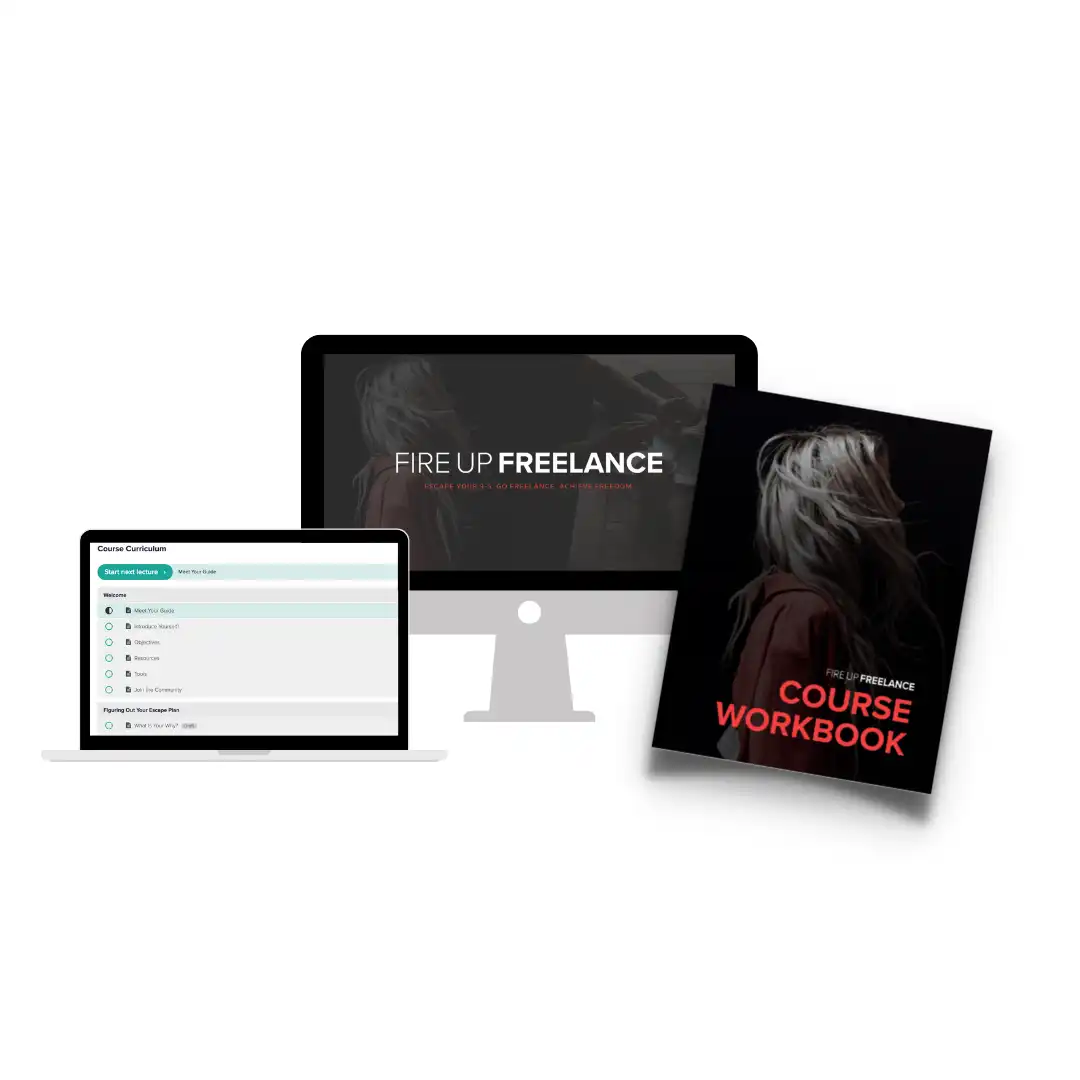If you’re tired of the daily 9 to 5 grind and answering to someone else, you may be wondering how to be self employed. Today it’s easier than ever, and with a few simple steps, a lot of patience, and a head full of goals, you too can become self employed.
Table of Contents
What Does Self Employed Mean?
Are you ready to transition from exhausted employee to freedom-filled freelancer? Join the Fire Up Freelance program to get all the training, templates, and tools you need to start a booming freelance business and escape your 9 to 5 job.
- Courses to help you learn, grow, and receive support as a freelancer
- Free resources to help you be successful
- Immediate Start
- The time needed to build a business and client base
If you’re self employed, you don’t work for another company and you don’t own any shares in a corporation. You work for the one person that matters the most – you.
Most self employed individuals are independent contractors, but the IRS has a few other ways of defining the self employed:
- Anyone who operates a business as a sole proprietor or independent contractor
- Anyone who is part of a partnership running a business or trade
- Anyone who is in business for themselves
Since members of an LLC (Limited Liability Company) are taxed the same as sole proprietors, they too are considered self employed.
In short, if you don’t get your paycheck from a company, you may be a self employed person.
Pros and Cons of Becoming Self Employed

Like any job or business, there are pros and cons of becoming self employed that you should consider before choosing it.
Pros
- You are the boss – It doesn’t get much better than that, right? There’s no one telling you when to work, how to work, or breathing down your neck to make sure you get the work done. If you want days off, you take them. If you want to work different hours, you do it.
- You make your own work environment – When you work for someone, you have to deal with their work environment, which sometimes can be toxic. If you’re the boss, you dictate who you are around and what you do.
- You have more flexibility – You have the right (and ability) to say yes or no to the jobs that come your way. When you work for someone, you have to do what they say, which often means doing jobs or tasks that are menial or not within your job description.
- You can work where you want – You don’t need a big office building or brick-and-mortar store when you’re self-employed. Because you’re in charge, you can decide where you work. If that means working from your home office, your bed, or the local coffee shop, the choice is yours.
- You have more tax benefits – As a self employed person, you can write off any applicable business expenses. The money comes right off your income, which lowers your tax liability. Depending on the business you are in, you may write off things like mileage, business trip expenses, and business equipment.
Cons
- You give up your benefits – When you work for a company, you likely have access to group health insurance, group life insurance, and an employer-matched 401K. You may also have access to paid time off for sick time, maternity leave, or other reasons. When you own your own business, you lose all those benefits and the expense of all insurance and retirement savings falls on your shoulders.
- You must pay self employment taxes – If you work for someone, you share the tax responsibility equally, paying half each. When you go off on your own, you are responsible for the entire 15.3% of the taxes.
- There’s a lot of pressure on your shoulders – You are responsible for every decision for the business, which some see as a benefit, but many people buckle under the pressure.
- You have to do all the ‘tasks’ – When you work for someone, you have an assigned role, as do others in the company. But when you run your own company, you are the accountant, marketing department, salesperson, and boss all in one.
How to Be Self Employed (9 Steps)
Are you ready to transition from exhausted employee to freedom-filled freelancer? Join the Fire Up Freelance program to get all the training, templates, and tools you need to start a booming freelance business and escape your 9 to 5 job.
- Courses to help you learn, grow, and receive support as a freelancer
- Free resources to help you be successful
- Immediate Start
- The time needed to build a business and client base
Like anything in life, planning is important if you want to learn how to be self employed. Here are the simple steps to take to start your life as an independent contractor or by owning your own business.
Decide What You Want to Do
Will you sell a product or service? What niche or void will you fill? Have a plan ready for what you have to offer and how you’ll offer it. Decide if you’ll need help or if you can manage all aspects of the business you want to start on your own.
Label the Value Your Product or Service Offer
Your product or service must fill a void. This means you need to find a hole in what your competitors offer so you stand out as better than them. While you may copy an idea or open a similar type of business as already exists, you need to give people a reason ‘why’ they should turn to you.
For example, if you start a writing service for small businesses, what do you bring to the table? If you do a quick search, you’ll find hundreds or thousands of businesses offering the same thing. Think about the experience, skills, or knowledge you have that sets your services apart.
Find Your Target Audience
It seems wise to market to everyone, but that usually doesn’t work. When you don’t have a specific target market in mind, it’s hard to hit them where it matters. You want to get to the matters of the heart or to the target audience’s pain points. When you market to anyone, you can’t get as specific as you need.
Think about who your product or service helps the most, and niche down even further from there. Get as specific as you can. For example, you identify that your product or service is for women but take it further. Narrow down to a particular age range, occupation, hobbies, or health needs to get as specific as possible.
Make a Business Plan
Once you’ve outlined your business, create a plan. Think about:
- How you will start the business (money, real estate, products, and equipment)
- Your vision for the company for the next year
- Your plan for the next 5 years
Create your mission and goals and write them down. You’ll need an official business plan if you’ll ask anyone for capital, but having a business plan written down also keeps you accountable.
Choose Your Business Model

Before moving forward, decide how you’ll operate your business. Will you start as an independent contractor or an LLC? If you’re worried about liabilities, an LLC protects your private information, but still taxes you as a sole proprietor.
All businesses start as sole proprietors (or independent contractors). If you want to become an LLC, you’ll need to fill out paperwork and get an Employer Identification Number (EIN). To make this process as easy as possible, use this free LLC operating agreement to establish the rights and responsibilities of each LLC member.
If you aren’t sure, talk with your financial advisor to see which business model makes the most sense for your financial situation and the business you planned.
Take Care of the Finances
When you own a business, all financial responsibilities fall on you. Budgeting, tracking income and expenses, paying taxes, and funding your business is your responsibility. If you don’t outsource your accounting needs, at the very least, consider the following:
- Open a business bank account that’s separate from your personal account
- Set up a budgeting app that automatically tracks your income and expenses
- Explore your options for healthcare
Automate As Much as You Can
As we said before, all responsibilities fall on you when you own a small business. If outsourcing isn’t in the budget right away, try automating as much as you can. We already talked about automating your budgeting, but there are many other areas of your business you can automate on a regular basis including:
- Social media posts
- Blog posts
- Email responses
- Lead generation
As you learn how to be self employed, you’ll need to make it a priority to make things easier for yourself, not harder.
Define Your Work Day
When you’re self employed, it’s easy to let your work life take over your personal life. There’s no more structured 9 to 5 hours or concrete start or end to your day.
It’s up to you to set up the structure. Here are a few ways to define your work day:
- Give yourself ‘commute time’ even if you work at home. Use the time to unwind, drink your coffee, read the news, or read a self-improvement book. This is your time to prep yourself for the day, much like you’d do on the ride into work.
- Set a start and end time. You don’t have to work 9 to 5. It doesn’t even have to be 8 hours a day, but setting a literal start and end time will give you mental boundaries. When you work at home, it’s easy to get caught up in the duties and burn the candle at both ends.
- Create space for your business. If you’ll operate your small business from your home, create a separate space that’s your ‘business space.’ Don’t work at the kitchen table where the kids do their homework and the family eats, for example. Find a corner of the house, even if it’s small to call your work space, and don’t use it for anything else.
- Involve your family in the business. Let your family know what your business does, how they can help, and when you need time to focus on nothing but the business. A clear work-life balance is important for your family, and communicating with them as much as possible is important.
9. Keep Learning
Even if you opened a business in an industry that you’re a self-proclaimed expert in, always keep learning. The economy, industries, and even yourself change all the time. Learning helps you grow, diversify, and keep your business going so you can keep up with your plan to be self employed.
Network often, turn to industry experts, and read self-improvement books daily, even if just for five minutes a day. The more you learn, the more you’ll be able to do with your business. You never truly stop learning how to be self employed.
Other Considerations for Moving to Self-Employment
Before you move to self employment, consider these factors to make it a smooth transition.
Save As Much as Possible
Self employment income is much more unpredictable than the money you earned at your 9 to 5 job. Before you jump in headfirst, make sure you have at least 6 – 12 months of expenses saved. If you have trouble starting or you hit a roadblock down the road, you’ll know you can still pay the bills while you smooth out the bumps.
Learn to Live a Frugal Lifestyle
It can be feast or famine when you’re self employed. Don’t get stuck living beyond your means and suffering financially during the ‘famine’ times.
Living a frugal lifestyle doesn’t mean you have to live like you’re poor. Instill these habits to keep bills low:
- Shut lights off when rooms aren’t in use
- Install a programmable thermostat and cut down on energy use when no one is home
- Meal plan and shop grocery sales
- Don’t eat out
- Entertain at home rather than going out
Think About Health Insurance
When you work for an employer, you can get group health insurance. Once you’re self employed, you’re on your own and it’s a lot harder, not to mention more expensive to get health insurance. Work with a reputable insurance agent or broker to find the plan that protects your family’s healthcare needs without breaking your budget.
Use Your Time Wisely
As a business owner, it’s easy to get sucked into your business and forget about family time or even ‘me time.’ Set boundaries and create time for everyone. If that means you set an alarm on your phone so you stop working at a certain time, do it. Don’t use the excuse that you’re the only one running the business to let it suck the life out of you. Your physical and mental health is important too.
Be a Good Communicator
As a self employed person, you are the face and voice of the business. No one is talking for you. Learn how to network, carry yourself confidently, and have conversations with anyone who could have an impact on your business.
How to Be Self Employed Today
Millions of people are self employed today, many of whom fell upon it because the pandemic forced their hand. If you’re thinking about and it and want to learn how to be self employed, dig in because now is the perfect time. Technology, the economy, and the movement to support small businesses today make it a great time to start your business sooner rather than later.
Are you ready to transition from exhausted employee to freedom-filled freelancer? Join the Fire Up Freelance program to get all the training, templates, and tools you need to start a booming freelance business and escape your 9 to 5 job.
- Courses to help you learn, grow, and receive support as a freelancer
- Free resources to help you be successful
- Immediate Start
- The time needed to build a business and client base
Samantha Hawrylack is a personal finance expert and full-time entrepreneur with a passion for writing and SEO. She holds a Bachelor’s in Finance and Master’s in Business Administration and previously worked for Vanguard, where she held Series 7 and 63 licenses. Her work has been featured in publications like Grow, MSN, CNBC, Ladders, Rocket Mortgage, Quicken Loans, Clever Girl Finance, Credit Donkey, Crediful, Investing Answers, Well Kept Wallet, AllCards, Mama and Money, and Concreit, among others. She writes in personal finance, real estate, credit, entrepreneurship, credit card, student loan, mortgage, personal loan, insurance, debt management, business, productivity, and career niches.


